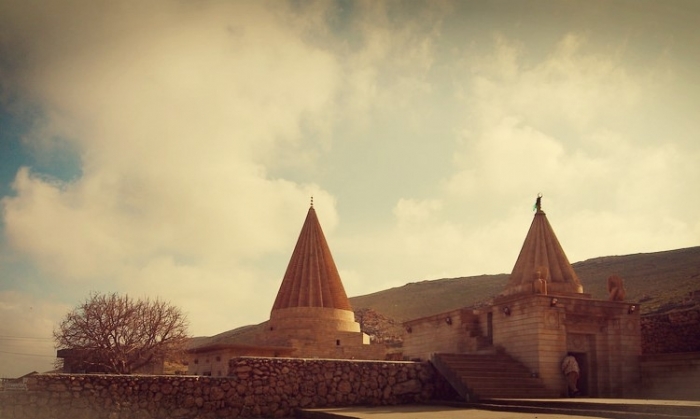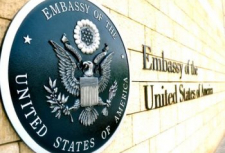Yazidi nationalism

Yazidis, from the first day of the expansion of Islam to their historical homeland, which covers the territory of the Kurdish nation, strive to preserve national identity and always defend traditional national interests. The Ottoman and Persian empires showed loyalty to all the Muslim peoples who were part of them, including the Muslim Kurds. All Muslims were considered equal, Kurdish language and culture were not prohibited. It is obvious that the Muslim world, United at that time under the rule of the Ottomans, had no idea about nationalism at all. The Kurds realized this only after the nation-States were formed in the region, and they remained outcasts. At the time, the nationalists were Yazidis, as the rule of Islam was based on religious intolerance. To understand the essence of Yazidi nationalism, it is necessary, first of all, to consider the origins of nationalism as such. According to the Bible and other sources, nationalism first emerged among the builders of the tower of Babel, after the United people rebelled against God. Since then, in relations between Nations, nationalism means giving preference, first of all, to one's own people over others. When asked what the nature of Yazidi nationalism is, I would answer: "the Yazidi character is laid down by the ancient peoples of Mesopotamia, who are Aryans, descended from the Sumerians, Babylonians, Medes and Sassanids."
Yazidi nationalism differs from the nationalism of other Nations in that it is based not on the superiority of its people, but on the priority of its people over others, while categorically rejecting any violence. This principle in its essence has remained unchanged for many centuries. Yazidism is a worldview, a common spiritual behavior, the same understanding of the seven thousand-year tradition in determining good and evil, happiness and unhappiness, an understanding of God and humanity. In the Holy of holies of the Yazidi temple of Lalish there was never pomp, luxury, or jewelry, only an invisible God, whom the Yazidis call "Hveda", which means "he created himself". This primitive belief in a God without an image irritated and provoked ridicule among the neighboring peoples. And the patron angel of the Yazidis, Malik Taus, an ever-unchanging spiritual principle with the image of a peacock, has always been subjected to gross insults. They did not want to believe that in this Holy of holies there is really nothing diabolical, parodied the name of their deity, transformed his name into "Shaitan", as if the Yazidis worship "the devil". This false point of view has caused Muslims to see the Yazidis as their bitter enemy.
Yazidi nationalism implies the ideology of an oppressed people and represents a "protective" nationalism. Unlike radical nationalism, Yazidi nationalism does not discriminate against other peoples or religions, nor does it emphasize the superiority of one nationality or religion over others. Yazidi nationalism is based on collective historical memory, love and devotion to its people, language and culture. By uniting public consciousness, it seeks to preserve national independence, to protect the natural rights of the nation, its territory of residence, economic resources, cultural and spiritual values. This ideology is based on a national feeling that is akin to patriotism and seeks to unite the different strata of Kurdish society, regardless of opposing class interests.
Yazidi nationalism is based on a religious Canon. Yazidi mentality and behavior are reduced to a dogma, which is briefly expressed as follows: "you can not do good, nor do evil." This principle was first formulated in the sacred hymns, and has since reigned uninterrupted in this society for many centuries, and has not yet lost its significance. He regulated and continues to regulate all actions of Yazidis not only from the religious and ceremonial point of view, but also in personal, family and public life.
Yazidis do not claim any domination, they stand only for national identity-the preservation of their culture, language and religion. To achieve its goal, Yazidi nationalism uses only spiritual and moral means – not to force the enemy, but to convince him. True Yazidi nationalism even dreams of some kind of Yazidi hegemony. He dreams only that one day his historical homeland Mesopotamia will become for all Kurds what Kurdistan should become according to the idea of modern Kurdish politicians and patriots.
Unfortunately, these dogmas, based on historical roots, a common land and a single race for many centuries did not find a response in the soul of fellow Kurds-Muslims. Logic recognizes only that nationalism which is based on a uniform way of thinking. If we look at this in terms of historical reality, we will see that the Kurds are now deciding which path to choose. But nothing can be more senseless than the concession of one's own national interests to any other interests, for example, Arab or Turkish.
Yazidi nationalism is based on the principle of non-violence. The Yazidi way of thinking was expressed in ancient times and in all the main for seven thousand years firmly and consistently adheres to this principle – you need to solve problems only without the use of force. It is in this continuity that the difference of the Yazidi way of thinking lies. This is the peculiarity of true Yazidi nationalism, the meaning of which is to overcome itself. In contrast to any other nationalism, it seeks not to assert itself, but to live in harmony with all the peoples of the world. Yazidism has never opposed other peoples and their religions. He has never called and does not call for the seizure of foreign lands, temples and property, the forcible subjugation of other peoples and their conversion to their religion. On the contrary, the doctrine of yazidism States that " everything on earth happens by the will of God, and no one has the right to contradict him." It is believed that if there are different peoples and religions in the world – Islam, Judaism, Christianity and others, then it is the will of God. Along with their shrines and Scriptures, the Yazidis venerate Muslim, Christian and other shrines, in particular the prophets Moses, Muhammad and Jesus. Yazidism of course condemns, but never prevented even the religious choice of fellow Kurds. The doctrine says: "God is one, and there are many ways to him, everyone has the right to choose his own path, and everyone is personally responsible for his actions before the Lord."
Source Yuri Dasni, Kurdistan.Ru
Tags: #yazidisinfo #yazidi #aboutyazidi #yezidi
Yazidi nationalism

Yazidis, from the first day of the expansion of Islam to their historical homeland, which covers the territory of the Kurdish nation, strive to preserve national identity and always defend traditional national interests. The Ottoman and Persian empires showed loyalty to all the Muslim peoples who were part of them, including the Muslim Kurds. All Muslims were considered equal, Kurdish language and culture were not prohibited. It is obvious that the Muslim world, United at that time under the rule of the Ottomans, had no idea about nationalism at all. The Kurds realized this only after the nation-States were formed in the region, and they remained outcasts. At the time, the nationalists were Yazidis, as the rule of Islam was based on religious intolerance. To understand the essence of Yazidi nationalism, it is necessary, first of all, to consider the origins of nationalism as such. According to the Bible and other sources, nationalism first emerged among the builders of the tower of Babel, after the United people rebelled against God. Since then, in relations between Nations, nationalism means giving preference, first of all, to one's own people over others. When asked what the nature of Yazidi nationalism is, I would answer: "the Yazidi character is laid down by the ancient peoples of Mesopotamia, who are Aryans, descended from the Sumerians, Babylonians, Medes and Sassanids."
Yazidi nationalism differs from the nationalism of other Nations in that it is based not on the superiority of its people, but on the priority of its people over others, while categorically rejecting any violence. This principle in its essence has remained unchanged for many centuries. Yazidism is a worldview, a common spiritual behavior, the same understanding of the seven thousand-year tradition in determining good and evil, happiness and unhappiness, an understanding of God and humanity. In the Holy of holies of the Yazidi temple of Lalish there was never pomp, luxury, or jewelry, only an invisible God, whom the Yazidis call "Hveda", which means "he created himself". This primitive belief in a God without an image irritated and provoked ridicule among the neighboring peoples. And the patron angel of the Yazidis, Malik Taus, an ever-unchanging spiritual principle with the image of a peacock, has always been subjected to gross insults. They did not want to believe that in this Holy of holies there is really nothing diabolical, parodied the name of their deity, transformed his name into "Shaitan", as if the Yazidis worship "the devil". This false point of view has caused Muslims to see the Yazidis as their bitter enemy.
Yazidi nationalism implies the ideology of an oppressed people and represents a "protective" nationalism. Unlike radical nationalism, Yazidi nationalism does not discriminate against other peoples or religions, nor does it emphasize the superiority of one nationality or religion over others. Yazidi nationalism is based on collective historical memory, love and devotion to its people, language and culture. By uniting public consciousness, it seeks to preserve national independence, to protect the natural rights of the nation, its territory of residence, economic resources, cultural and spiritual values. This ideology is based on a national feeling that is akin to patriotism and seeks to unite the different strata of Kurdish society, regardless of opposing class interests.
Yazidi nationalism is based on a religious Canon. Yazidi mentality and behavior are reduced to a dogma, which is briefly expressed as follows: "you can not do good, nor do evil." This principle was first formulated in the sacred hymns, and has since reigned uninterrupted in this society for many centuries, and has not yet lost its significance. He regulated and continues to regulate all actions of Yazidis not only from the religious and ceremonial point of view, but also in personal, family and public life.
Yazidis do not claim any domination, they stand only for national identity-the preservation of their culture, language and religion. To achieve its goal, Yazidi nationalism uses only spiritual and moral means – not to force the enemy, but to convince him. True Yazidi nationalism even dreams of some kind of Yazidi hegemony. He dreams only that one day his historical homeland Mesopotamia will become for all Kurds what Kurdistan should become according to the idea of modern Kurdish politicians and patriots.
Unfortunately, these dogmas, based on historical roots, a common land and a single race for many centuries did not find a response in the soul of fellow Kurds-Muslims. Logic recognizes only that nationalism which is based on a uniform way of thinking. If we look at this in terms of historical reality, we will see that the Kurds are now deciding which path to choose. But nothing can be more senseless than the concession of one's own national interests to any other interests, for example, Arab or Turkish.
Yazidi nationalism is based on the principle of non-violence. The Yazidi way of thinking was expressed in ancient times and in all the main for seven thousand years firmly and consistently adheres to this principle – you need to solve problems only without the use of force. It is in this continuity that the difference of the Yazidi way of thinking lies. This is the peculiarity of true Yazidi nationalism, the meaning of which is to overcome itself. In contrast to any other nationalism, it seeks not to assert itself, but to live in harmony with all the peoples of the world. Yazidism has never opposed other peoples and their religions. He has never called and does not call for the seizure of foreign lands, temples and property, the forcible subjugation of other peoples and their conversion to their religion. On the contrary, the doctrine of yazidism States that " everything on earth happens by the will of God, and no one has the right to contradict him." It is believed that if there are different peoples and religions in the world – Islam, Judaism, Christianity and others, then it is the will of God. Along with their shrines and Scriptures, the Yazidis venerate Muslim, Christian and other shrines, in particular the prophets Moses, Muhammad and Jesus. Yazidism of course condemns, but never prevented even the religious choice of fellow Kurds. The doctrine says: "God is one, and there are many ways to him, everyone has the right to choose his own path, and everyone is personally responsible for his actions before the Lord."
Source Yuri Dasni, Kurdistan.Ru
Tags: #yazidisinfo #yazidi #aboutyazidi #yezidi

























